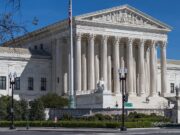Contribution limits are monetary restrictions on the amount an individual or group can donate to a political actor – usually a candidate, political party, or political action committee. The Supreme Court first allowed limits on contributions in Buckley v. Valeo. The Court’s ruling acknowledged that contribution limits were a restriction on First Amendment activity, but allowed them on the theory that they prevented “corruption or its appearance.” Contribution limits vary wildly depending on the jurisdiction, from a few hundred dollars to no limit whatsoever. As of 2018, the federal government limits contributions to candidates to $2,700 per election while 11 states allow individuals to give to their preferred candidates without limit.
The right to support candidates or causes that you believe in is a core First Amendment right. Limits on one’s political donations infringe on that right. While the Supreme Court has generally accepted contribution limits, that doesn’t mean such limits are good policy. Evidence from the past 40 years of contribution limits, provides little evidence that such restrictions have reduced corruption, as the Court anticipated, or achieved their proponents’ stated goal of promoting a healthy democracy.














